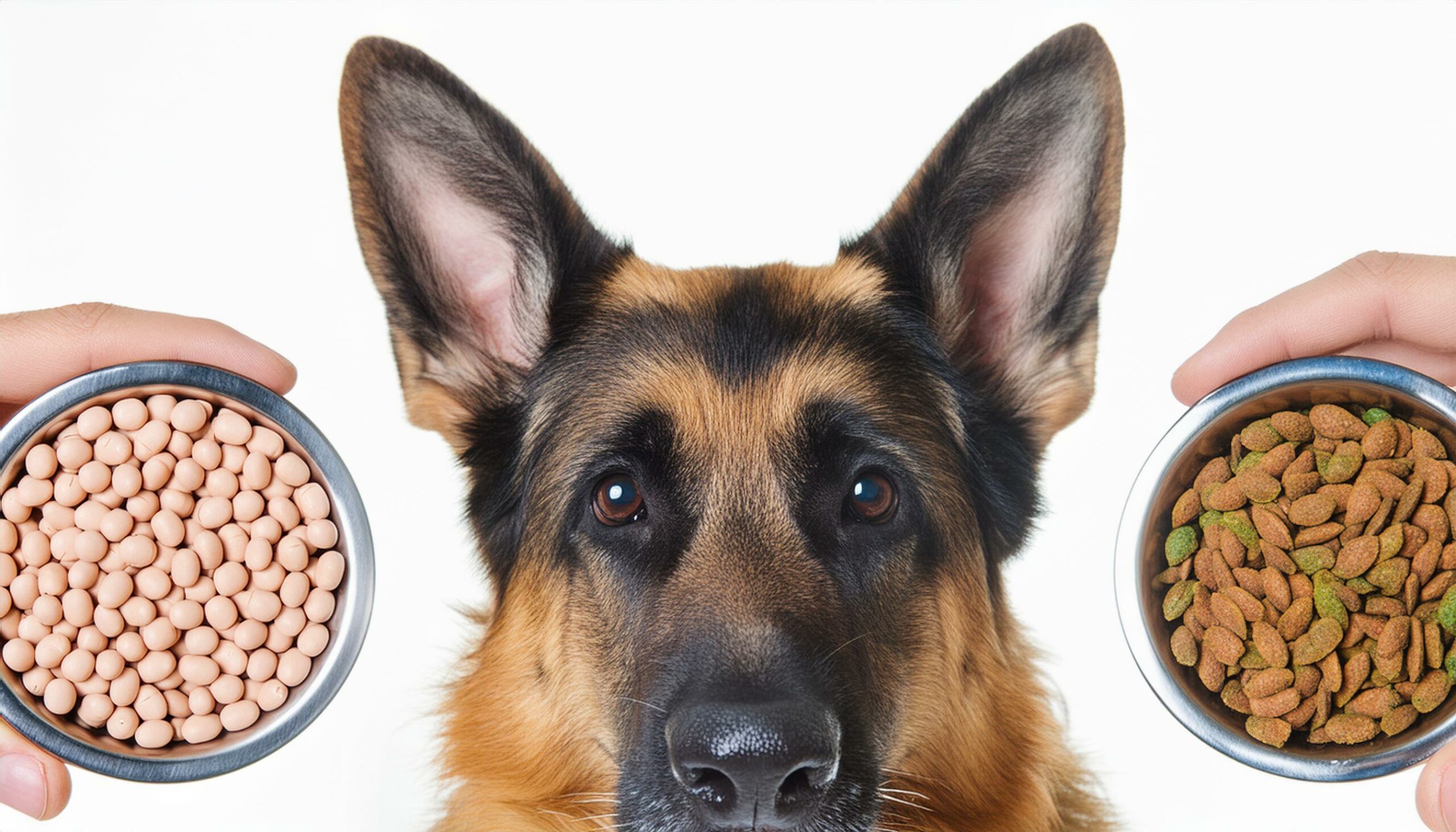German Shepherds, renowned for their intelligence and loyalty, require a well-rounded diet to support their active lifestyle and maintain optimal health. In this comprehensive guide, we’ll explore the essential components of a German Shepherd’s diet, from protein and fats to carbohydrates and vitamins, providing valuable insights to help you make informed decisions about your furry friend’s nutrition.
Understanding a German Shepherd’s Dietary Needs
German Shepherds, like all dogs, have unique dietary requirements that evolve throughout their life stages. Factors such as age, activity level, and existing health conditions play crucial roles in determining their nutritional needs. For instance, puppies require higher levels of certain nutrients to support growth and development, while senior dogs may benefit from specialized diets tailored to address age-related issues.
Protein-rich Foods
Protein serves as the building block for muscle development, tissue repair, and overall vitality in German Shepherds. Incorporating high-quality sources of protein into their diet is essential for promoting lean muscle mass and supporting an active lifestyle. Lean meats such as chicken, turkey, and beef, along with fish and eggs, are excellent sources of bioavailable protein that can help meet your German Shepherd’s dietary requirements.
Healthy Fats and Oils
Healthy fats play a crucial role in maintaining your German Shepherd’s skin and coat health, as well as supporting cognitive function and joint mobility. Look for sources of omega-3 and omega-6 fatty acids, such as salmon, flaxseed, and olive oil, which provide essential nutrients to promote overall well-being. Incorporating these fats into your dog’s diet can contribute to a shiny coat, improved skin health, and enhanced cognitive function.
Carbohydrates for Energy
Carbohydrates serve as a primary source of energy for German Shepherds, providing fuel for their active lifestyle and supporting metabolic functions. Opt for complex carbohydrates like sweet potatoes, brown rice, and oats, which offer sustained energy release and help regulate blood sugar levels. While carbohydrates should not comprise the majority of your dog’s diet, they play a valuable role in meeting their energy requirements and promoting overall health.
Vitamins and Minerals
Vitamins and minerals are essential for maintaining your German Shepherd’s overall health and immunity. Fresh fruits and vegetables are rich sources of essential nutrients such as vitamin A, vitamin C, and calcium, which play key roles in supporting immune function, bone health, and vision. By incorporating a diverse array of fruits and vegetables into your dog’s diet, you can ensure they receive the vitamins and minerals necessary for optimal health and vitality.
Hydration
Proper hydration is vital for supporting your German Shepherd’s overall health and well-being. Ensure they have access to clean, fresh water at all times, especially during hot weather or after vigorous exercise. You can also supplement their diet with moisture-rich foods such as wet dog food or water-rich fruits and vegetables to help maintain hydration levels and support optimal kidney function.
Avoiding Harmful Foods
Some foods are toxic to dogs and should be strictly avoided in your German Shepherd’s diet. These include chocolate, grapes, onions, garlic, and foods containing xylitol, all of which can be harmful or even fatal if ingested. Additionally, some dogs may have food sensitivities or allergies to common ingredients such as wheat, corn, or soy, so it’s essential to monitor their reaction to new foods and consult with your veterinarian if you suspect an adverse reaction.
Feeding Schedule and Portion Control

Establishing a consistent feeding schedule and practicing portion control are essential for maintaining your German Shepherd’s weight and overall health. Divide their daily food intake into two or three meals, spaced evenly throughout the day, and avoid free-feeding to prevent overeating. Consult with your veterinarian to determine the appropriate portion sizes based on your dog’s age, weight, and activity level, and adjust as needed to maintain a healthy body condition.
Supplements
While a well-balanced diet should provide all the nutrients your German Shepherd needs, some dogs may benefit from additional supplementation, particularly those with specific health concerns or dietary deficiencies. Common supplements for German Shepherds include glucosamine and chondroitin for joint health, omega-3 fatty acids for coat and skin health, and probiotics for digestive health. However, it’s essential to consult with your veterinarian before introducing any supplements to ensure they’re safe and appropriate for your dog’s individual needs.
Transitioning to a New Diet
If you’re considering switching your German Shepherd to a new diet, it’s essential to do so gradually to avoid gastrointestinal upset. Start by mixing a small amount of the new food with their current food and gradually increase the proportion over the course of a week or two until they’re fully transitioned. Monitor their reaction to the new diet closely and consult with your veterinarian if you have any concerns or questions during the transition process.
Monitoring and Adjusting
Regularly monitor your German Shepherd’s overall health and well-being, including their coat condition, energy levels, and digestive function. These can serve as valuable indicators of whether their diet is meeting their nutritional needs. If you notice any changes in their health or behavior, such as lethargy, excessive shedding, or gastrointestinal upset, consult with your veterinarian to determine the appropriate course of action and make any necessary adjustments to their diet.
Consulting with a Veterinarian
While this guide provides general recommendations for feeding German Shepherds, every dog is unique, and their dietary needs may vary. It’s essential to consult with a veterinarian or canine nutritionist to develop a nutrition plan tailored to your dog’s specific requirements and address any health concerns or dietary questions you may have. Your veterinarian can provide valuable guidance and support to help ensure your German Shepherd receives the best possible care and nutrition throughout their life.
Conclusion
In conclusion, providing your German Shepherd with a balanced and nutritious diet is essential for supporting their overall health, vitality, and longevity. By understanding their specific dietary needs and incorporating high-quality ingredients into their daily meals, you can help ensure that your furry friend thrives and enjoys a happy, healthy life by your side.
FAQs
What are some common health issues in German Shepherds related to diet?
German Shepherds may be prone to certain health issues such as hip dysplasia, digestive problems, and skin allergies, which can be influenced by diet and nutrition.
Can I feed my German Shepherd homemade food?
Yes, homemade food can be a viable option for feeding your German Shepherd, provided it’s properly balanced and nutritionally complete. Consult with a veterinarian or canine nutritionist to ensure your homemade recipes meet your dog’s specific dietary needs.
How do I know if my German Shepherd is allergic to a certain food?
Signs of food allergies in German Shepherds may include itching, redness or inflammation of the skin, ear infections, gastrointestinal upset, and chronic licking or chewing. If you suspect your dog has a food allergy, consult with your veterinarian for proper diagnosis and treatment.
Is it okay to give treats to my German Shepherd?
Yes, treats can be a valuable tool for training and bonding with your German Shepherd, but it’s essential to choose treats made from high-quality ingredients and offer them in moderation. Limit treats to no more than 10% of your dog’s daily caloric intake to avoid weight gain and nutritional imbalances.
Should I give my German Shepherd supplements if they seem healthy?
While supplements are not always necessary for healthy dogs, some German Shepherds may benefit from additional support for specific health concerns or conditions. Consult with your veterinarian before adding any supplements to your dog’s diet to ensure they’re safe and appropriate for your dog’s individual needs.
